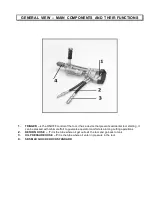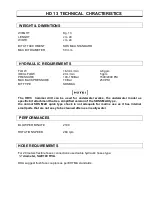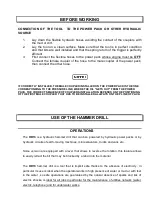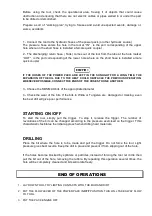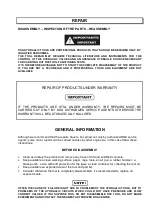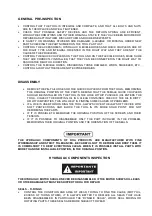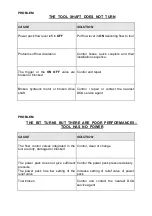
WITH THE TOOL PERFECTLY DRY, SPRAY A PROTECTIVE-DEWATERING PRODUCT (CRC-or WD40)
ON THE TOOL AND ON THE QUICK COUPLERS.
DRY UP COMPLETELY THE TOOL HANDLE TO GUARANTEE A FIRM GRIP
PERIODICAL CONTROLS
EVERY TIME THE EQUIPMENT IS USED :
1. CONTROL THAT THE TRIGGER RETURN SPRING IS EFFICIENT , AND THAT THE SCREWS,
THE VALVES, AND ALL COMPONENTS ARE WELL INSTALLED AND EFFICIENT, IN CASE
SOMETHING IS DAMAGED IMMEDIATELY DISCARD THE PART OR INFORM YOUR FOREMAN
SO THE PARTS WILL NOT BE REUSED
2. CLEAN THE TOOL AND ITS HOSES AND THE REST OF THE EQUIPMENT
3 - PERFORM A GENERAL INSPECTION OF ALL THE EQUIPMENT
MAINTENANCE OF THE OIL FLEXIBLE HOSE
INSPECTION OF THE HOSE
•
Lay the flexible hoses on the floor and control if there are oil leaks and the hose
surfaces are integral without peeled sections showing metallic braid with broken steel
wires.
•
the presence of little sections of wire braid can be tolerated only if the wires are not
broken and still braided.
•
Control the pressed bushing at the extremity of the hydraulic hoses and discard
immediately hoses showing bending, squeezing, or deformations.
•
Check that the quick couplers are well dry, without oil leaks and that the knurled
bushing on the female quick coupler is intact and can slide freely during the
connections. The male coupler should be intact, without dents and deformations. If you
try to force the connection of a damaged male coupler, this will damage irremediably
also the female.
•
If the oil flexible hose and quick couplers show oil leaks, even if the couplers are well
screwed into the hose fittings, they should be immediately substituted with new parts.
•
Replace hoses that show squeezing, unnatural bending, deformations, swellings, etc…
CARE AND MAINTENANCE OF THE OIL FLEXIBLE HOSES
The flexible hose can be cleaned with a hydro cleaner or pressure washer after having laid
it on a clean surface. Clean with the water jet in particular near the area of the clips where
the dirt is going to deposit.
Move the hoses and wash completely in particular the quick couplers.
Blow the hoses with an air gun in particular in the area of the quick couplers.
Roll up the flexible hoses in a roll having a diameter of about 60-70 cm and connect the
quick couplers at the ends in the “head/tail” way. This operation will protect them against
impacts or scraping.
Place the hose in a safe and dry place, protected from bumps and weather





